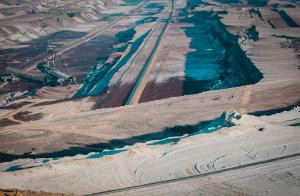
Critical Raw Materials (CRMs) - such as lithium, nickel, copper, cobalt, manganese, graphite and rare earth elements - are essential to deliver on the Paris Agreement and Sustainable Development Goals (SDGs). In the build-up to COP27, UNECE and partners are mobilizing to address the challenges of meeting skyrocketing demand for these key resources in a sustainable manner, convening a Forum on Regional cooperation on enhancing sustainable management and financing for the critical raw materials required for low-carbon transitions (17 October), in partnership with the Egyptian Presidency of COP27 and the UN Climate Change High-Level Champions for COP26 and COP27.
Financing: a core challenge as demand surges
CRMs will underpin increased renewable energy use, battery production and the mass shift to electric vehicles. They are also key for digitalization. Demand is already surging, with expected increases of over 40% for copper and rare earth elements over the next two decades, 60-70 % for nickel and cobalt, and almost 90% for lithium; while the World Bank estimates that over 3 billion tonnes of minerals and metals will be needed to deploy wind, solar and geothermal power and energy storage required to deliver a future below 2°C.
The production, refining and use of these materials in low carbon technologies will also require billions of dollars of financing. In this context, the mobilization of finance through public-private sector collaboration and the use of climate finance instruments, such as green bonds, could play a crucial role in securing access to the necessary capital, to foster innovation, and support the transfer of expertise.
Sustainability issues must remain at forefront
Meeting rising demand for CRMs is a key challenge in the UNECE region, which as a major producer and consumer of resources, must optimize the management of its endowments. The current energy crisis has further underscored the challenges of strengthening energy security, affordability and resilience while accelerating urgently needed decarbonization efforts.
Beyond the challenges of delivering the sheer quantities of CRMs needed, complex issues must urgently be addressed to ensure their supply is sustainable, ethical and resilient. This will require careful attention to environmental, economic and social considerations.
The sustainable management of critical raw materials is a key component of the UN Secretary-General’s strategy for transforming extractive industries for sustainable development and forms a growing part of UNECE’s broad support for climate change mitigation and adaptation.
Convening key stakeholders to advance solutions
As part of a series of five fora organized by the UN Regional Commissions in the build-up to COP27, the UNECE Regional Forum will bring together high-level policy and decision-makers from Ministries of Economy, Finance, Trade, Industry, Energy and Environment in the region.
Mining and metals industry leaders, the financial sector, and civil society representatives will be invited to participate, along with key stakeholders in the area of sustainable consumption and production and the circular economy.
High-level speakers will include UN Deputy Secretary-General Ms. Amina J. Mohammed (via video message), UNECE Executive Secretary Olga Algayerova, H.E Mr. Sameh Shoukry, Egyptian Minister for Foreign Affairs and COP27 President Designate (via video message), H.E. Dr. Mahmoud Mohieldin, UN Climate Change High-Level Champion for COP27 and UN Special Envoy on Financing the 2030 Agenda for Sustainable Development, and UK COP Envoy Dr. John Murton.
Key objectives include to:
● Facilitate engagement with a broad set of partners and stakeholders to accelerate public and private investment in concrete initiatives, platforms, and projects.
● Identify and share climate finance and investment opportunities that also support the acceleration of access to clean energy and digital transformations, which remain key catalysts for the SDGs.
● Highlight successful examples of countries leveraging investment opportunities for climate action as well as of financial institutions and investors turning climate commitments into action and financial flows.
● Connect development partners, governments, private sector investors, industry and civil society to propose and consider concrete instruments and initiatives that accelerate action toward the goals of the Paris Agreement and the 2030 Agenda.
● Advocate for a transparent process that allows countries to showcase their investments in climate action, responsible use of raw materials for green growth, and for measures of progress to complement GDP.
The Forum will be held in Geneva and online. The programme and registration details are available at https://unece.org/sustainable-energy/events/forum-climate-financing-CRM
The UNECE Regional Forum is the last of the five regional fora to be held, following events in Addis Ababa, Ethiopia (2-4 August), Bangkok, Thailand (25 August), Santiago, Chile (31 August – 1 September) and Beirut, Lebanon (15 September).

